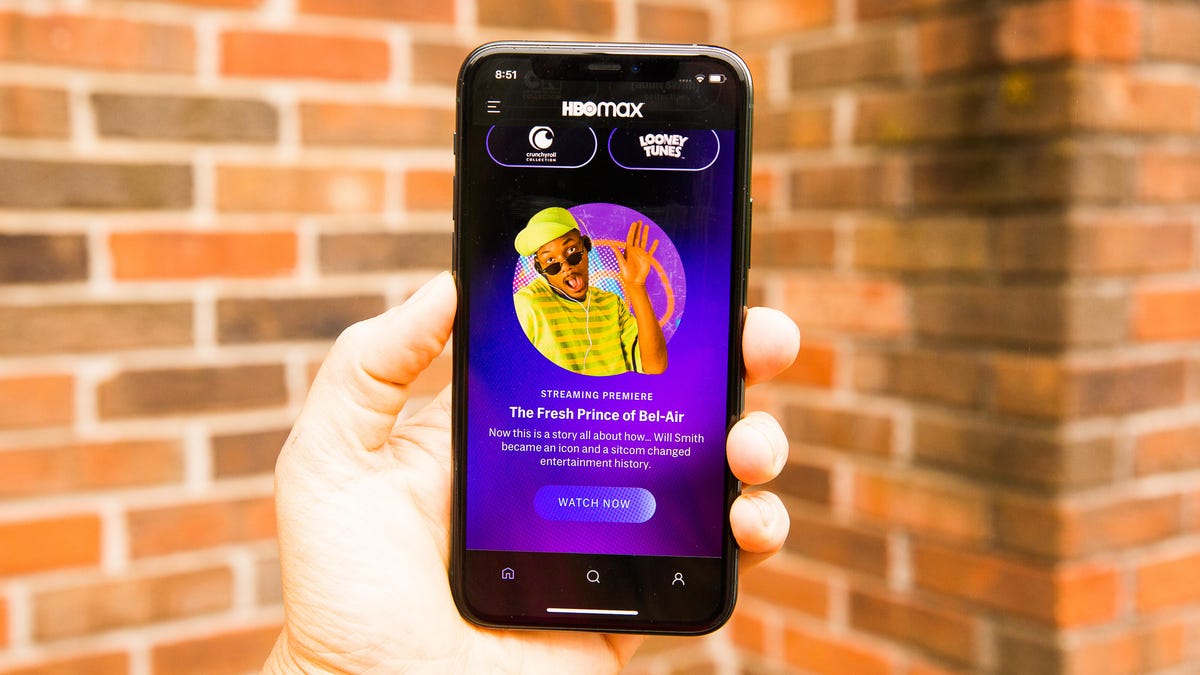HBO Max won't eat up AT&T data plans
AT&T wireless customers without unlimited plans can stream HBO Max without fear, but Netflix and Disney Plus will still eat up data.

AT&T wireless subscribers can stream HBO Max without going over their data plans.
AT&T wireless customers without unlimited data plans won't have to worry about going over their data usage when streaming HBO Max. The company isn't counting usage from its own streaming service, but competing services like Netflix and Disney Plus can still eat up data plans.
AT&T confirmed in an email to CNET on Wednesday that wireless subscribers streaming HBO Max video won't incur data charges, which the company said will help its customers save money.
"This is based on a sponsored data arrangement and is a program we offer on the same terms to any entities who wish to sponsor data for their customers," a spokesman told CNET. "This is similar to arrangements some of our competitors have."
News of AT&T's plan to "zero rate" the HBO Max video stream was first reported by The Verge.
AT&T's WarnerMedia launched its HBO Max streaming service last month, making it one of several rivals in the streaming wars trying to unseat leaders, Netflix and Amazon's Prime Video. Other entrants now include Disney Plus and NBCUniversal's Peacock, owned by Comcast. To help give the new service a boost, AT&T is allowing its wireless customers, who don't subscribe to an unlimited plan, the option to stream the service without fear of going over their data plans. But the practice, also known as zero-rating, is not without controversy.
Unlimited video streaming
Under the "sponsored data" or "zero rating" business model, AT&T allows a company to pay it for data charges that a customer incurs while using that company's service. So instead of the customer paying for the data, the company pays for it.
Here's how it works. Let's say you offer a streaming video service. Video eats up tons of data. Since mobile customers pay for the data they use, you as a video provider may want to pay for your customers to stream your service without having to worry about paying for the data charges, thus providing customers an incentive to use your service over someone else's that incurs data charges.
AT&T has been offering this "sponsored data" program to video streaming service providers since 2014. Initially, the company restricted the option to AT&T wireless customers who are on postpaid plans, which are plans in which customers pay their bill at the end of the month. It expanded the offer in 2018 to prepaid subscribers.
But here's the catch. So far, the only video streaming services that participate in the "sponsored data" program are owned by AT&T. AT&T's U-verse TV service and its Direc TV streaming service can also be streamed by AT&T wireless customers without eating up their data packages.
Other popular streaming services, which are not owned by AT&T, do not participate in the program. This means when AT&T wireless customers who stream videos from Netflix or Disney Plus still see that usage count against their monthly data caps. This inherently makes the HBO Max streaming service more attractive.
The net neutrality debate and 'zero rating'
Critics say AT&T's sponsored data program and others like it violate the spirit of net neutrality, because it allows the company to favor its own streaming service over a competitor's service. AT&T argues that its sponsored data program is open to any company that wants to pay them for their customers' data usage.
But the reality is that isn't happening. And even though AT&T says that HBO Max is paying the cost of the data usage for its subscribers, the arrangement results in AT&T just paying itself.
To be clear, the current FCC repealed Obama-era net neutrality rules in 2017. So there are no actual rules in place that AT&T could be violating.
But the previous FCC under Democrat Tom Wheeler made clear it had concerns with AT&T's and others' sponsored data programs. The agency opened an investigation and before ceding control to Republicans in 2017, Wheeler's FCC concluded that AT&T and Verizon had violated a provision in the net neutrality rules. Specifically, the agency concluded that AT&T's pricing of its DirecTV Now service had unfairly disadvantaged competitors, like Netflix.
At the time, AT&T argued it didn't violate the net neutrality rules and also said that the general conduct rule was way too broad.
Nothing ever came of the FCC's claims. Republicans took charge of the agency shortly after the report was filed. In addition to repealing the 2015 net neutrality rules, FCC Chairman Ajit Pai, a Republican appointed by President Donald Trump, also closed the investigation into AT&T and the other companies over zero rating. The agency has never taken action against AT&T nor Verizon over the claims. And the sponsored data programs live on.

